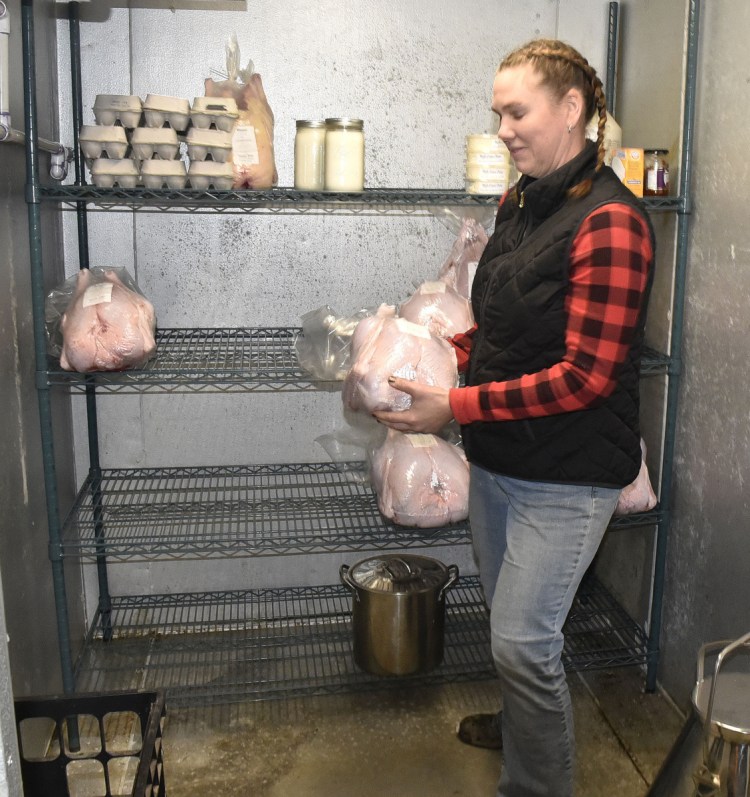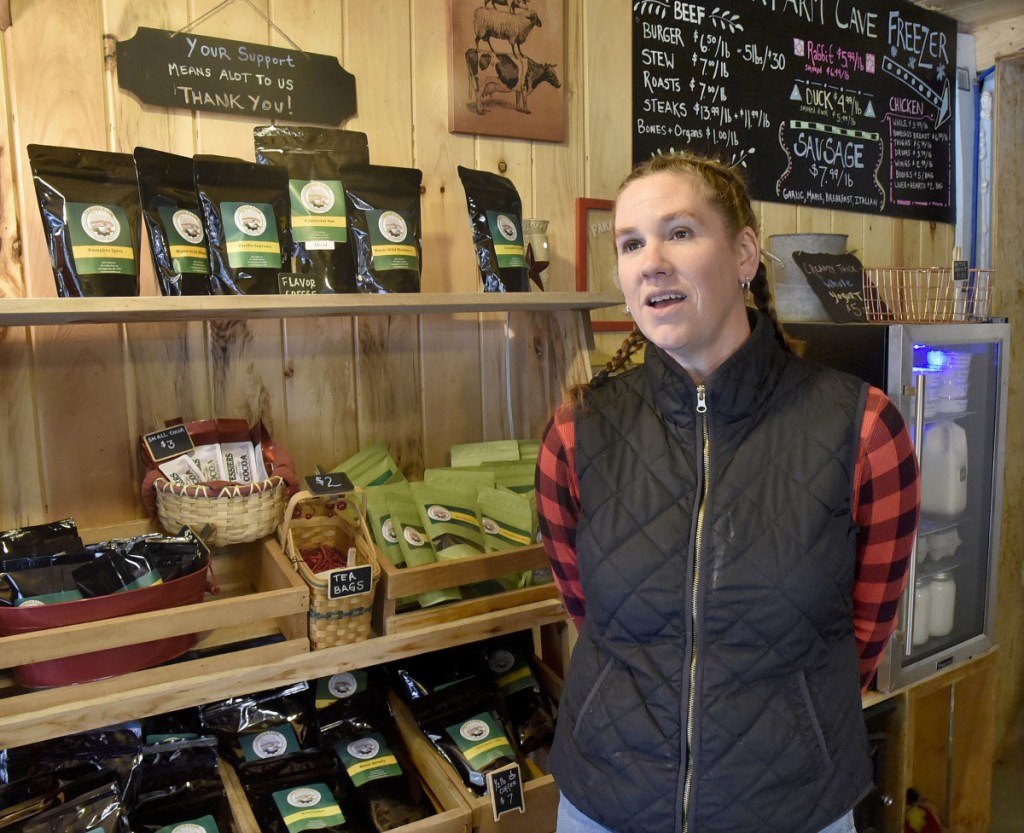SKOWHEGAN — Christmas music was playing Tuesday at the Tessier Farm store on Malbons Mills Road as Carrie Tessier brought out fresh turkeys to customers for Thanksgiving.
Twenty turkeys ranging in size from about 11 pounds to just over 17 pounds were processed Sunday right at the farm with husband Jason and their two daughters, Makenzie, 15, and Kelly, 12.
“It really counts that we were able to raise them for that many people — dealing directly with the community,” she said. “Our prices are reasonable because we want to help the community. We have a state-inspected shop and a small-farm exemption, so we can process poultry and sell it.
“That is unique. I think we’re unique.”
The Tessiers will have about 30 people over for Thanksgiving dinner this year, down from a record of about 42 last year.
And keeping everybody happy and safe, as well as well fed, is job one.
Carrie Tessier, 42, stresses the importance of proper handling and preparation from the pickup of the fresh turkey to the picking of leftovers after the meal.
To start with, Tessier said, people picking up a fresh — never frozen — turkey should be prepared to bring a cooler, with ice, if they are not going home immediately to refrigerate the bird. She said she provides a bag of ice to each customer.
Each bird is shrink-wrapped to prevent bacteria exposure, but be sure to keep the bird cool, she said.
Tessier said it’s important to wash your hands with soap and water and make sure preparation surfaces are clean before and after coming in contact with an uncooked turkey. Cooks can prevent cross-contamination by using different cutting boards to separate the uncooked turkey from vegetables and other food for the big dinner.
“Rinse it and take the giblets out, for whatever you might do with those,” she said. “Don’t stuff the turkey the night before; they say that bacteria can build up in the stuffing. It can harbor bacteria if you stuff it too early.”
She said she recommends cooking the turkey at 350 degrees, for about 15 minutes per pound, making sure it’s done all the way through, or about five hours for a 20-pound bird.
The National Turkey Federation recommends cooking the turkey to a minimum internal temperature of 165 degrees as measured by a food thermometer. In cooking a whole bird, be sure to check under the thigh and wing and the thickest part of the breast to make sure it is fully cooked.
“Cooking to the proper temperature will kill all bacteria with absolute certainty,” the federation notes.
And watch out for leftovers, Tessier said.
“Leftovers — don’t leave them out,” she said. “Pick the bird and do what you’re going to do, but don’t leave them out. After you cook it, I would put it away as soon as possible. The USDA says so.”
The Tessiers raise a commercial breed of white broad-breasted turkeys, which are free-range but technically not organic because they are fed commercial grain. The feed does not contain chemicals or medication, Tessier said.
Tessier said the trend of cooking a fresh turkey at Thanksgiving is becoming more popular, as Mainers and others look to the move from farm to table.
Maine farmers are raising more and more turkeys for the meat market, according to Maine’s Department of Agriculture, Conservation and Forestry, with the number of live turkey poults being brought into the state up 30 percent last year over the previous year, the Portland Press Herald reported.
Tessier agreed.
“We have 20, but I probably could have sold that many twice,” she said. “I think people are more interested in how they were raised and supporting local. This year we made a point of doing them as close to Thanksgiving as we could — they’re fresh — so I bought them a little later this year.”
The Tessiers buy their day-old poults on line from a hatchery in Iowa, for delivery to the local post office. From there they are housed under a heating lamp in July until they are put out to free-range pasture, with an A-frame coop for shelter, where they have access to grass, seeds and bugs to fatten up on.
“I think it improves their overall health — keep ’em moving, keep ’em active for fun,” she said. “Turkeys are really friendly. They are very friendly for a big bird.”
Doug Harlow — 612-2367
Twitter:@Doug_Harlow
Send questions/comments to the editors.





Success. Please wait for the page to reload. If the page does not reload within 5 seconds, please refresh the page.
Enter your email and password to access comments.
Hi, to comment on stories you must . This profile is in addition to your subscription and website login.
Already have a commenting profile? .
Invalid username/password.
Please check your email to confirm and complete your registration.
Only subscribers are eligible to post comments. Please subscribe or login first for digital access. Here’s why.
Use the form below to reset your password. When you've submitted your account email, we will send an email with a reset code.